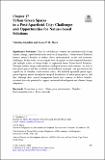Files in this item
Urban green spaces in a post-apartheid city : challenges and opportunities for nature-based solutions
Item metadata
| dc.contributor.author | Giombini, Valentina | |
| dc.contributor.author | Thorn, Jessica | |
| dc.contributor.editor | Ieva Misiune, Daniel | |
| dc.contributor.editor | Depellegrin, Lukas Egarter Vigl | |
| dc.date.accessioned | 2022-07-08T10:30:28Z | |
| dc.date.available | 2022-07-08T10:30:28Z | |
| dc.date.issued | 2022-07-01 | |
| dc.identifier | 280387863 | |
| dc.identifier | 45b2f41c-ac5f-4f81-bc65-23cbe4a991f3 | |
| dc.identifier.citation | Giombini , V & Thorn , J 2022 , Urban green spaces in a post-apartheid city : challenges and opportunities for nature-based solutions . in D Ieva Misiune & L E V Depellegrin (eds) , Human-nature interactions : Exploring nature’s values across landscapes . Springer , Cham , pp. 207-219 . https://doi.org/10.1007/978-3-031-01980-7_17 | en |
| dc.identifier.isbn | 9783031019791 | |
| dc.identifier.isbn | 9783031019821 | |
| dc.identifier.isbn | 9783031019807 | |
| dc.identifier.other | ORCID: /0000-0003-2108-2554/work/117568919 | |
| dc.identifier.uri | https://hdl.handle.net/10023/25635 | |
| dc.description | The authors thank Climate Research 4 Development fellowship (CR4D-19-21) for funding the Urban Ecolution project – implemented by the African Academy of Sciences in partnership with the UK’s Department for International Development, Weather and Climate Information Services for Africa programme and the African Climate Policy Centre of the United Economic Commission for Africa. This study has also been funded in part by the African Women in Climate Change Science Fellowship supported by the African Institute of Mathematical Sciences Next Einstein Forum and the International Development Research Centre of Canada Aid, the UK’s Research and Innovation’s Global Challenges Research Fund under the Development Corridors Partnership project (ES/P011500/1). | en |
| dc.description.abstract | Cities in sub-Saharan countries are simultaneously facing climate change, rapid urbanisation, and social inequalities. Nature-based Solutions harness nature’s benefits to address these environmental, social, and economic challenges. In this study, we investigate how taking into account temporal dynamics and multiple values of nature helps to implement better Nature-based Solutions. Through satellite images and interviews with practitioners and residents, we look at how green spaces and dry riverbeds are distributed, managed, and perceived in the capital city of Namibia, south-western Africa. We find that apartheid spatial segregation legacies persist through the unequal distribution of urban green spaces, and that, although their current management limits their capacity to deliver benefits, riverbeds have the potential to support sustainable development and climate change adaptation. | |
| dc.format.extent | 524379 | |
| dc.language.iso | eng | |
| dc.publisher | Springer | |
| dc.relation.ispartof | Human-nature interactions | en |
| dc.subject | Ecosystem services | en |
| dc.subject | River networks | en |
| dc.subject | Namibia | en |
| dc.subject | Environmental justice | en |
| dc.subject | Urban green infrastructure | en |
| dc.subject | G Geography (General) | en |
| dc.subject | SDG 11 - Sustainable Cities and Communities | en |
| dc.subject | SDG 13 - Climate Action | en |
| dc.subject.lcc | G1 | en |
| dc.title | Urban green spaces in a post-apartheid city : challenges and opportunities for nature-based solutions | en |
| dc.type | Book item | en |
| dc.contributor.institution | University of St Andrews. School of Geography & Sustainable Development | en |
| dc.identifier.doi | 10.1007/978-3-031-01980-7_17 | |
| dc.identifier.url | https://doi.org/10.1007/978-3-031-01980-7 | en |
This item appears in the following Collection(s)
Items in the St Andrews Research Repository are protected by copyright, with all rights reserved, unless otherwise indicated.

